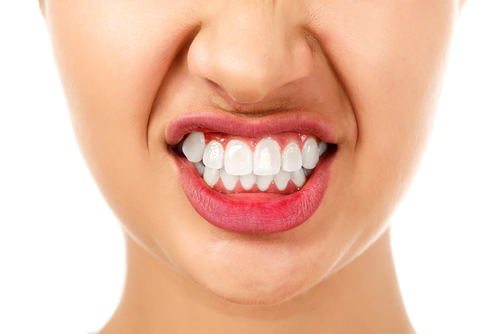Is Grinding Your Teeth Bad For You?
Also Known As: Bruxism
Short answer
Teeth grinding is usually harmless in the short-term. However, long-term, bruxism can pose serious dangers to your health. If you are an offender of teeth grinding, it is in your best interest to stop the habit as quickly as possible.
Category 'F' is for things that fail to bring anything beneficial to the table, and are very harmful to your health. We recommend completely avoiding anything in this category. Long-term side effects of 'F' items are usually very serious.
View Full Grading System
Category 'A'
Very healthy and numerous health benefits. Side effects are rare. Things rated an 'A+' are typically necessary for survival (for example, water).
Very healthy and numerous health benefits. A few harmful qualities may be associated, but only under certain circumstances such as an allergic reaction.
Very healthy and numerous health benefits. Harmful qualities may be associated, but aren't usually serious.
It is important to note that even the best things in life can become bad in immoderate amounts. So, although something may be rated an 'A+', overconsumption/overdoing can bring unwanted effects.
Category 'B'
Very beneficial to your health. Things rated a 'B+' may have a few harmful qualities to pay attention to.
Overall beneficial to your health. Things rated a 'B' may have some harmful qualities to pay attention to.
More beneficial to your health than not. However, harmful qualities are most likely associated and shouldn't be overlooked.
The main difference between category 'A' and category 'B' is the harmful qualities typically present in 'B' items. Serious side effects are usually uncommon, but are still possible and should be taken note of.
Category 'C'
Both beneficial and harmful qualities associated. Things rated a 'C+' are typically a bit more on the beneficial side. Still, moderation is important.
A fairly even ratio of beneficial and harmful qualities. Moderation is important. Very general topics that can lean towards both sides of the spectrum will be placed here as well. Rice, for example, can be good or bad depending on the type.
More harmful than beneficial. Side effects are common, especially when consumed/done excessively. Moderation is very important.
Category 'C' usually denotes to both good and bad qualities. When it comes to this category, it is important to keep this word in mind: moderation.
Category 'D'
Harmful to your health. Although benefits may be associated, the bad most likely outweighs the good. Moderation is very important.
Harmful to your health. A few benefits may be associated, but the bad outweighs the good. Moderation is extremely important.
Harmful to your health. Very few, if any, benefits are present. Things in this category should be avoided as much as possible.
Category 'D' is typically for things that are more harmful than beneficial. While consuming/doing something unhealthy once in a blue moon shouldn't hurt, we definitely recommend eliminating 'D' items as a regular part of your routine/diet.
Category 'F'
Category 'F' is for things that fail to bring anything beneficial to the table, and are very harmful to your health. We recommend completely avoiding anything in this category. Long-term side effects of 'F' items are usually very serious.
Category 'N'
'N' stands for neutral. Things placed into this category are generally (a) neither good nor bad for you, or (b) lack the necessary evidence to reach any conclusions.
Long answer
Teeth grinding (henceforth referred to by its medical term, bruxism) is the habit of grinding one's teeth together. It is common in children, but may continue into adulthood. Even people who do not have bruxism may develop it as adults, with about 10% of the adult population being bruxers. Bruxism has several causes, including stress, drinking alcohol, smoking, doing drugs, and taking antidepressants or antipsychotic medication. Bruxism most often occurs during one's sleep, with enough force being applied by the grinding to crack a walnut.
Most of the time, bruxism is harmless - if not annoying. However, it can cause serious problems over the long run. The normal rate of enamel erosion is about 0.3 mm per decade. Therefore, a person in his or her mid-twenties should have just under one millimeter of enamel erosion. However, bruxers may experience up to two millimeters of enamel erosion in the same period!
Another problem that can occur as a result of bruxism is the wearing down of teeth far enough to require various dental procedures such as a root canal, an implant, a crown, or even dentures. While the teeth take the brunt of the force, the jaw is not left unaffected and people who suffer from chronic bruxism may develop temporomandibular joint disorder (TMD), which can cause tremendous joint pain. People who grind their teeth also may experience headaches, especially in the morning after bruxing while asleep.
With no actual cure, the only thing to do to prevent bruxism is to change your lifestyle or wear a mouth guard (especially at night).
Possible short-term side effects
Possible long-term side effects
- enamel erosion
-
tooth chipping
-
tooth wear and tear
-
tmd
Healthier alternatives
Please turn your Ad Blocker off to see this content. Thank you!
Thank you for your feedback!
Written by Jeff Volling
Published on: 12-27-2015
Last updated: 12-10-2016
Thank you for your feedback!
Written by Jeff Volling
Published on: 12-27-2015
Last updated: 12-10-2016

 Approved by
Approved by 















